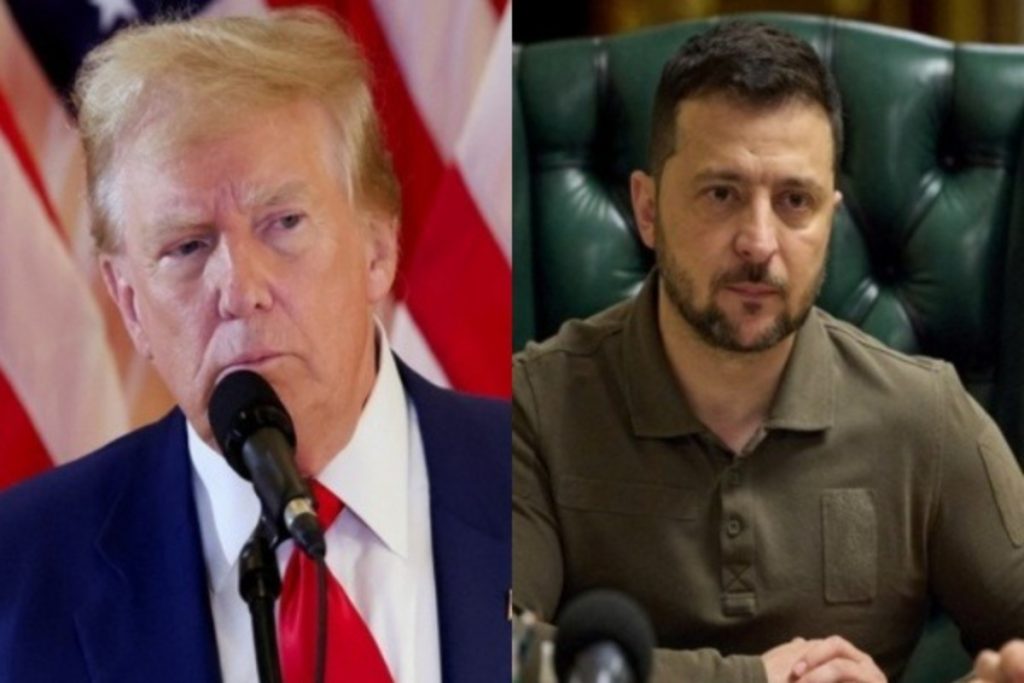Former US President Donald Trump spoke on the phone with Ukrainian President Volodymyr Zelenskyy during which he pledged to end the conflict in Ukraine if elected to become president again.
He also pledged that once elected, he would bring “peace to the world.”
Trump took to Truth Social on Friday to announce his “very good call” and said that the Ukrainian leader had condemned the assassination attempt on him and extended congratulations on the successful Republican National Convention in Milwaukee.
“He condemned the heinous assassination attempt last Saturday and remarked about the American people coming together in the spirit of unity during these times,” Trump said on his social media platform, as cited by CNN.
“I appreciate President Zelenskyy for reaching out because I, as your next President of the United States, will bring peace to the world and end the war that has cost so many lives and devastated countless innocent families. Both sides will be able to come together and negotiate a deal that ends the violence and paves a path forward to prosperity.”
During his June 27 pre-election debate with US President Joe Biden, Trump had promised that, if re-elected, he would be able to end the conflict before his inauguration on January 20 next year.
In a post on X describing the call, Zelenskyy said he congratulated Trump on his nomination and condemned the “shocking assassination attempt in Pennsylvania.”
“I wished him strength and absolute safety in the future,” he said. “I noted the vital bipartisan and bicameral American support for protecting our nation’s freedom and independence.”
Last week, when Zelenskyy was in the US, he said that “everyone is waiting for November,” including Putin. He also said that Biden and Trump are “very different,” but both support democracy and “Putin will hate both of them,” CNN reported.
Ukraine is concerned over the fact that the country could lose vital US support as Trump’s campaign surges and Biden’s falters. Trump’s public comments have varied between criticising US backing for Ukraine’s defence and supporting it, while his running mate, JD Vance, has been a leader of Republican efforts to block US military and financial assistance to Ukraine since Russia invaded in 2022.
Addressing a fireside chat with US media outlet NPR at the Aspen Media Forum, US Secretary of State Antony Blinken addressed the possibility that the US might stop providing aid to Ukraine in the future.
“So we’ve done a number of things, and look, every administration has an opportunity, of course, to set its own policies. We can’t lock in the future,” he said when asked if the US will continue to provide aid to Ukraine if Donald Trump is elected president.
“But just a week ago at the NATO summit, we had more than 20 countries come together on the margins of the summit to announce that they had negotiated and signed 10-year bilateral security agreements with Ukraine. And that means that all of these countries, including the United States, have committed to helping Ukraine for the next decade, build up its deterrent capacity and its defences. Now, if we were to renege on that, I suppose that’s possible. But happily, we have another 20-some odd countries – and we’re heading to more than 30 – that will be doing the same thing. These are long-term commitments to Ukraine,” Blinken said.
“Vladimir Putin has already failed. He’s failed in the objective he set, which was to erase Ukraine from the map, to end its existence as an independent state, to subsume it into a greater Russia. That has failed and it cannot succeed,” Blinken told NPR Radio.
Meanwhile, Zelenskyy became the first foreign leader to attend Britain’s cabinet meeting in person since former US president Bill Clinton in 1997.
The New York Times said that Zelenskyy’s visit to Downing Street on the invitation of UK’s new Prime Minister Keir Starmer at a summit of more than 45 European leaders at Blenheim Palace, near Oxford, Ukraine, was high on the agenda, and he won renewed pledges of support for his battle against the forces of Russia’s President Putin.
After his discussions with European leaders on Thursday, the British prime minister promised coordinated action against what he called Russia’s “shadow fleet” of tankers that deliver Russian oil around the world in defiance of Western sanctions.
